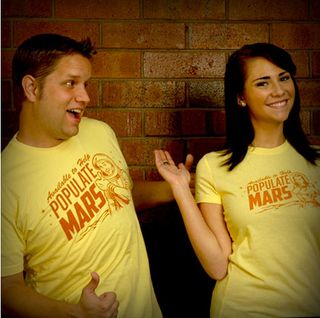
A private Mars colonization effort is about to get more interactive.
The Netherlands-based nonprofit Mars One, which aims to land four settlers on the Red Planet in 2025, has launched a new project called "Mars Exchange" to help answer questions and spur discussion about the group's ambitious plans.
"Mars Exchange will foster a worldwide dialogue and encourage thought-provoking conversations on the subject of the human permanence on Mars," Mars One co-founder and CEO Bas Lansdorp said in a statement. "Mars One advisers, NASA scientists, Mars One team members and even a Nobel Prize winner will contribute."
In the interview, Peck discusses whether or not a one-way Mars mission of the type envisioned by Mars One — which has no plans to bring the pioneers back to Earth — is "insane." (Peck thinks there are plenty of reasons that might inspire people to go live on Mars permanently.)

Mars One hopes to blast four astronauts toward the Red Planet in 2024 as the vanguard of a permanent colony. Four additional colonists would arrive every two years to augment the settlement.
The organization plans to launch a series of unmanned Mars missions in the coming years to prepare for the arrival of people. The first of these, which is scheduled to lift off in 2018, would demonstrate key technologies required for a human mission and place a communications satellite in Mars orbit, Mars One representatives have said.
Mars One intends to pay for its activities primarily by staging a global media event around the entire colonization process, from astronaut selection through the settlers' time on Mars. Astronaut selection is ongoing; in May, the group announced that it had winnowed its stable of candidate colonists to 705 from an initial pool of more than 200,000 applicants.
Get the Space.com Newsletter
Breaking space news, the latest updates on rocket launches, skywatching events and more!
Follow Mike Wall on Twitter @michaeldwall and Google+. Follow us @Spacedotcom, Facebook or Google+. Originally published on Space.com.
Join our Space Forums to keep talking space on the latest missions, night sky and more! And if you have a news tip, correction or comment, let us know at: community@space.com.

Michael Wall is a Senior Space Writer with Space.com and joined the team in 2010. He primarily covers exoplanets, spaceflight and military space, but has been known to dabble in the space art beat. His book about the search for alien life, "Out There," was published on Nov. 13, 2018. Before becoming a science writer, Michael worked as a herpetologist and wildlife biologist. He has a Ph.D. in evolutionary biology from the University of Sydney, Australia, a bachelor's degree from the University of Arizona, and a graduate certificate in science writing from the University of California, Santa Cruz. To find out what his latest project is, you can follow Michael on Twitter.
